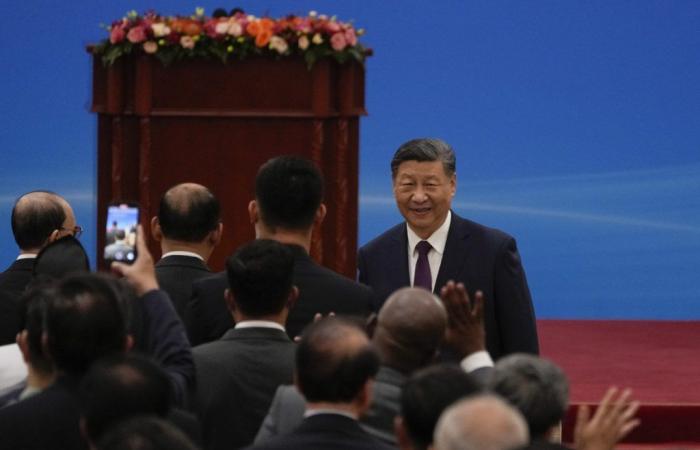Only a few hours had passed since the televised debate between the two candidates for the White House, when Xi Jinping appeared in the Great Hall of the People in Tiananmen Square.
The world still has in its eyes the unedifying figure of Joe Biden and a “challenge between the elderly” which, according to the popular nationalist commentator Hu Xijin, “is negative publicity for Western democracy”. With convenient timing to say the least, the Chinese president launches his “global” program in a broad speech at the opening of the conference for the 70th anniversary of the Five Principles of Peaceful Coexistence. Those five principles have been the mainstay of China’s foreign policy since 1954, when they first appeared in an exchange and dialogue agreement with India through the Tibet Autonomous Region. It is what the Chinese media present as a sort of “antidote to the “chaos” and “decadence” of American politics, which Beijing seems destined for a new moment of confusion due to the elections.
Today, between war in Ukraine and conflict in the Middle East, China feels it is time to bring those five principles to the global stage. Furthermore, this is the basis of the positions expressed by Beijing on all the international crises in recent years. Already their creator, the then Prime Minister Zhou Enlai, referred to “mutual respect for sovereignty and territorial integrity, mutual non-aggression, non-interference in each other’s internal affairs, equality and mutual benefit and peaceful coexistence”. An omnipresent terminology in Chinese diplomatic action.
Xi, however, elevates those five principles to make China a sort of “lighthouse” of the so-called global South, which he addressed several times in his speech, defining it as “a vital force in promoting human progress”. The establishment of a research center on emerging countries has been announced, to which one thousand scholarships and one hundred thousand training opportunities will be dedicated over the next five years. There is also a political connection aspect, as a program for young leaders will be launched.
When he talks about reforming international governance, Xi thinks of the role of the expanded BRICS, which are increasingly attracting countries from the global South, including China’s Asian neighbors. In recent weeks, Thailand and Malaysia have announced their application to join the platform, which Beijing has increasingly openly described as a more “fair and inclusive” model than US-led “small circles” like the G7.
Xi has assured that China “will not go down the wrong path that leads to the pursuit of hegemony”, a fault that is usually attributed to Washington, maintaining that Beijing “plays a constructive role” in Ukraine and in the Middle East. It is no mystery that Xi, whose presence at the Brazilian G20 in November was just made official, aims with Lula at a second peace conference also recognized by Moscow.
Also listening to the Chinese president’s speech were several former Western leaders, including Massimo D’Alema and Dominique de Villepin. Xi also promised “major global reforms” aimed at “expanding openness and forming a more market-oriented economic environment.” An attempt at reassurance in view of the crucial third Plenum of the Communist Party in mid-July, in which economic policies for the coming years will be prepared. Even more so after the debate between Biden and Trump, China is trying to present itself as a responsible power, in contrast to an America portrayed as increasingly older and confused.






